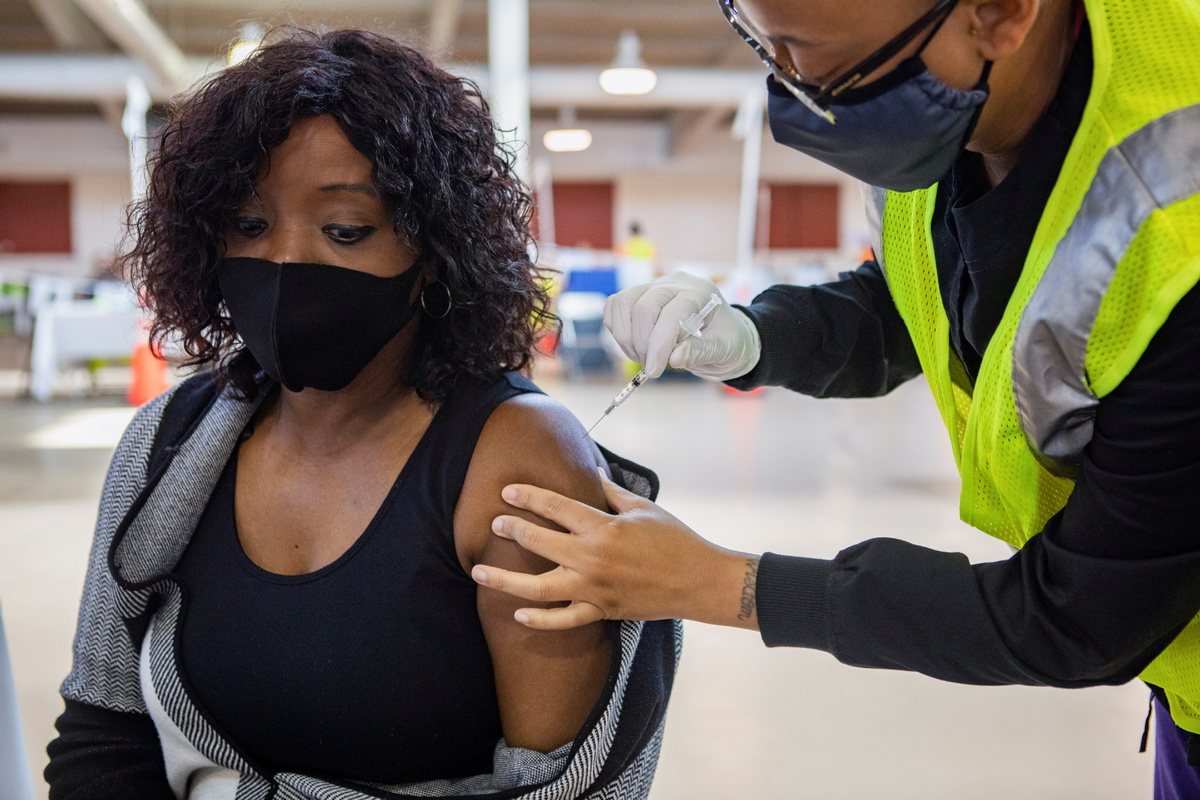The next COVID-19 hurdle: Hesitancy about getting vaccine
By MINLU ZHANG in New York | chinadaily.com.cn | Updated: 2021-03-05 13:12

Poll finds about one-third in US reluctant to get shots, fearing side effects or preferring to wait
Despite President Joe Biden announcing that there will be enough vaccine in May for all adults in the US, a significant percentage of Americans say they are hesitant about getting a vaccine, and some anti-vaccine activists are saying that COVID-19 shots are deadly.
The anti-vaccine groups are blaming patients' coincidental medical problems on COVID-19 vaccines, even when it is clear that age or underlying health conditions are to blame. Anti-vaccine groups have falsely claimed for decades that childhood vaccines cause autism.
"They will sensationalize anything that happens after someone gets a vaccine and attribute it to the vaccine," Dr Peter Hotez, an infectious diseases specialist and author of Preventing the Next Pandemic: Vaccine Diplomacy in a Time of Anti-Science, told CNN.
Twitter announced Tuesday that it will ban users who repeatedly tweet harmful misinformation about COVID-19 vaccines. If users accrue "five strikes", they face a permanent ban.
About one-third of Americans are hesitant about getting vaccinated, according to a new poll. Among those, 19 percent say they will probably receive the vaccine, and 17 percent say they probably won't.
The poll from The Associated Press-NORC Center for Public Affairs Research, which surveyed 1,055 American adults from Jan 28 through Feb 1, found that while 67 percent of Americans said they will definitely get vaccinated or already have been inoculated, 15 percent aren't certain they will. Of those who said they are skeptical to get the vaccine, 60 percent cited concerns about side effects, and 48 percent are waiting to see if it is safe.
The poll suggests that substantial vaccine hesitancy persists more than a month and a half since the start of vaccination in the US. People without college degrees, black Americans, Republicans and younger adults are more inclined to be skeptical of COVID-19 vaccines, according to the poll.
Meanwhile, the Johnson & Johnson one-shot COVID-19 vaccine has been singled out for "moral concerns" by the US Conference of Catholic Bishops, as well as at least six other dioceses from across the country, including New Orleans and St. Louis. They have released statements over the shot due to its use of cell lines that descend from cells taken in the 1980s from the tissue of aborted fetuses.
In a statement released Tuesday, the Conference of Catholic bishops drew a subtle distinction between vaccines from Pfizer and Moderna, which used abortion-derived cell lines only in testing the vaccine's efficiency. But the J&J vaccine used an abortion-derived cell line not only in testing but in development and production, which the bishops group said raises "moral concerns".
President Joe Biden and Dr Anthony Fauci, the nation's leading infectious disease expert, are both Catholic. Biden hasn't commented, but Fauci urged Americans to take whatever vaccine is immediately available to them.
"All three of them are really quite good, and people should take the one that's most available to them. People need to get vaccinated as quickly and as expeditiously as possible," Fauci told NBC News on Sunday. "If I would go to a place where they had Johnson & Johnson, I would have no hesitancy whatsoever to take it."
A new Harvard University survey published Monday found that pregnant women and mothers of children younger than 18 in the US have the lowest willingness to receive the vaccine, compared with other countries.
A survey of 18,000 women in 16 countries conducted by researchers at the T.H. Chan School of Public Health at Harvard found the highest vaccine acceptance in India, the Philippines and Latin American countries, with more than 60 percent acceptance among pregnant women. The vaccine-acceptance rate in the US and Russia is below 45 percent among pregnant women, according to the survey.
"Our study confirmed that COVID-19 vaccine hesitancy is multifaceted," Julia Wu, a senior author of the survey said in a report. "The perceived threat of COVID-19, level of trust in public health agencies, and existing pre-COVID 19 vaccine attitudes play key roles shaping vaccine acceptance and confidence."
About one-third of troops on active duty or in the National Guard have declined voluntary vaccinations, military officials recently told Congress. In some places, such as Fort Bragg, North Carolina, the nation's largest military installation, acceptance rates are below 50 percent, according to The New York Times.
A recent survey by the military family nonprofit Blue Star Family found that military spouses appear to share that hesitation. The survey of 674 active-duty family members released in December showed 58 percent said they wouldn't allow their children to receive the vaccine.
"I'm not sure I want to be a guinea pig, and I really don't want my kids to be either," one military spouse said. "I want to know the side effects and what can happen in 20 years."
Agencies contributed to this story.
























